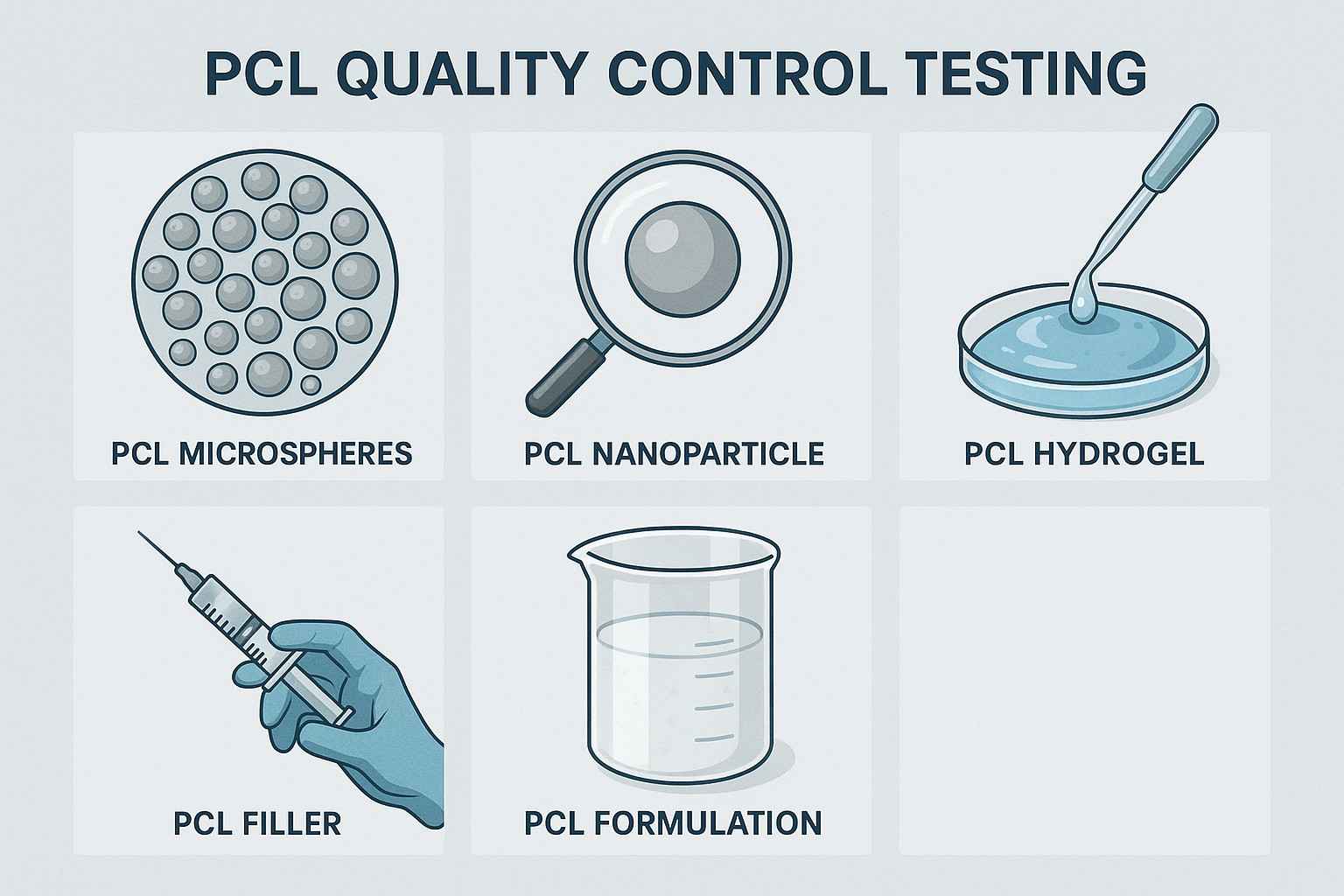
BOC Sciences provides comprehensive quality control testing services for polycaprolactone (PCL) products, covering various forms such as microspheres, nanoparticles, hydrogels, fillers, and formulation products. Our quality control services include physicochemical property testing, such as particle size distribution, thermal properties, and mechanical performance; component analysis and characterization, including molecular structure and purity testing; and stability and degradation testing to ensure long-term stability of materials in different environments. We also offer biocompatibility assessments, including sterility, endotoxin, and cytotoxicity tests, ensuring the safety of the products. Additionally, BOC Sciences conducts release behavior and functionality evaluations, simulating the drug release and active ingredient release processes during actual use.
BOC Sciences possesses leading testing technologies and equipment, enabling efficient and precise PCL quality control services, ensuring the reliability and consistency of test results.
Our quality control team has many years of industry experience and is proficient in the testing requirements of PCL and its derivatives, providing professional and personalized technical support to clients.
Based on the diverse product needs of clients, we offer tailored testing solutions to ensure that quality control for each project meets specific application standards and requirements.
BOC Sciences offers high flexibility and a fast response mechanism, allowing tests to be completed in a short time and results to be promptly delivered, helping clients accelerate product development and market entry.
We adhere to international quality management standards, ensuring that all testing processes and procedures comply with ISO and other certification requirements to guarantee that each service meets top industry standards.
We have a deep understanding of the unique needs of industries such as medical aesthetics, cosmetics, and biomedical fields, providing accurate quality control services to clients based on years of industry experience.
BOC Sciences offers a comprehensive range of quality control testing services for PCL and its related formulations, aimed at ensuring the safety, stability, and efficacy of products in fields like medical aesthetics, cosmetics, and biomedicine. Our services include tests for important parameters such as particle size distribution, purity analysis, solubility testing, mechanical properties, residual solvents, and more. We ensure that each batch of PCL products meets international quality standards and adheres to customer's strict requirements. Whether in the R&D stage or during production quality control, BOC Sciences is committed to providing scientific, accurate, and efficient testing services to help clients succeed in the competitive market.
Applicable to long-acting drug delivery, cosmetic filling, tissue repair, and other applications.
Used in targeted delivery, biosensing, transdermal absorption, and other fields.
Applicable to tissue engineering scaffolds, injectable systems, and skin barrier repair.
Focused on facial shaping, anti-aging, and repair cosmetic applications.
Including drug carrier systems, copolymer systems, and cosmetic active delivery systems.
BOC Sciences also offers comprehensive in vitro and in vivo testing services for PCL and its microsphere formulations to ensure the safety and efficacy of products in biomedical applications. Our in vitro testing platform includes cell culture, cell proliferation, cytotoxicity, cell migration, and other experiments, helping clients evaluate the biocompatibility and functionality of PCL and its derivatives at the cellular level. For in vivo testing, BOC Sciences provides animal model support to evaluate key parameters such as the distribution, degradation rate, immune response, and biocompatibility of PCL microspheres within animals. Through long-term animal trials, we ensure the safety and effectiveness of PCL formulations during the preclinical phase, helping clients reduce risks in the product development process and enhance the success rate of clinical applications. Whether in vitro or in vivo, BOC Sciences' comprehensive services provide reliable scientific data to support product optimization and registration applications.
BOC Sciences' PCL quality testing platform is equipped with advanced testing devices and extensive technical expertise, dedicated to providing professional and comprehensive quality control testing services for the medical aesthetics, cosmetics, and biomedical fields. The core goal of our platform is to assist clients in ensuring the quality of PCL formulations, enhancing their competitiveness in the market. With precise testing instruments and a well-established service system, we can provide efficient quality assessments for various PCL products and offer clients relevant data support to facilitate smooth product development, production, and market promotion.
BOC Sciences' PCL quality testing platform is tailored for the medical aesthetics, cosmetics, and biomedical fields, providing precise and efficient quality control testing services. The platform combines advanced testing equipment and mature technical methods to meet the high standards required by clients in different fields. Whether it's PCL microspheres, nanoparticles, hydrogels, or fillers, our testing platform offers comprehensive performance evaluations to ensure the quality and safety of each batch. By supporting multiple industry applications, we help clients obtain valuable data support in product development, production monitoring, and quality assurance, accelerating product launch and market success.

Polycaprolactone (PCL) is a biodegradable linear polyester that exhibits excellent mechanical properties, thermal stability, and biocompatibility. It appears as a transparent, colorless solid at room temperature, with a low melting point (approximately 60 °C) and high biodegradability, gradually breaking down into non-toxic intermediates in the body. The molecular chain of PCL is adjustable, making it suitable for the preparation of microspheres, nanoparticles, hydrogels, and other forms, and it is widely used in drug delivery, tissue engineering, and medical aesthetics.
Polycaprolactone (PCL) is known for its excellent biocompatibility and low toxicity, making it widely used in the medical and biomedical fields. It degrades into non-toxic intermediates in the body through hydrolysis and has low immunogenicity, typically not causing significant immune or toxic reactions. PCL materials undergo thorough biocompatibility assessments and have been proven safe in various biomedical applications, including drug delivery carriers, tissue engineering scaffolds, and medical aesthetic fillers. However, relevant quality control standards must be followed during use to ensure the safety and efficacy of the products.